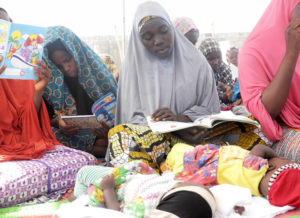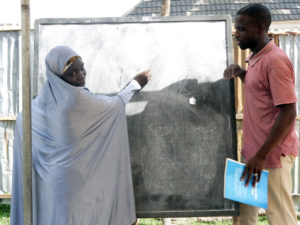[vc_row][columna_vc][vc_column_text]
Después de escapar de Boko Haram, Una niña nigeriana encuentra esperanza en la educación
Por Chima Onwe y Evelyn Rupert
[/vc_column_text][/columna_vc][/vc_row][vc_row][vc_columna ancho=»2/3″][vc_column_text]
Para jóvenes que enfrentan un trauma, Las clases ofrecen más que solo académico.
ADAMAWA, Nigeria: Hau'wa practica su respiración. Ella coloca sus manos sobre su estómago., inhalando profundamente, y cuenta hasta 10.
Está sentada con sus compañeros de clase en un centro de aprendizaje no formal en esta ciudad del norte, donde parte de su educación se dedica al aprendizaje social y emocional. El ejercicio de respiración es una herramienta que ayuda a los estudiantes a aprender a controlar su ira.
La instrucción tiene como objetivo ayudar a Hau’wa, 15, afrontar el trauma que ya ha experimentado, a manos de Boko Haram.
En cinco estados, 1,300 centros de aprendizaje no formal similares apoyados por la Respuesta a la crisis educativa en Nigeria El programa está ayudando a estudiantes como Hau'wa..
Con la ayuda de las comunidades, El programa está aumentando la disponibilidad de espacios de aprendizaje seguros y protectores que brindan instrucción en materias académicas básicas., Servicios integrales como apoyo socioemocional y habilidades para la vida para niños y jóvenes desplazados internos y no escolarizados..
En el noreste de Nigeria, donde Boko Haram ha aterrorizado a las comunidades durante más de una década, Esta programación puede fomentar la curación y desarrollar la resiliencia.. Centrándose en el bienestar general de los estudiantes., Los centros de aprendizaje no formal tienen como objetivo ayudar a los niños a recuperar un sentido de normalidad y comunidad y fomentar el éxito educativo..
El programa está financiado por la A NOSOTROS. Agencia para el Desarrollo Internacional e implementado por Creative Associates International en asociación con el Comité Internacional de Rescate y más que 30 Organizaciones nigerianas.
Una infancia y una educación interrumpidas

“Desde que era muy pequeña, Hau'wa siempre quiso ir a la escuela.," Dice la madrastra de Hau'wa, Aisha..
Aisha dice que desde muy pequeña, Hau'wa observaba con entusiasmo a los niños mayores regresar a casa después de clases con sus uniformes.. Hau'wa se convirtió en una estudiante dedicada y esperaba ser maestra algún día..
Pero en agosto 2014, La vida de Hau'wa dio un vuelco cuando ella y sus compañeros de clase escucharon disparos y gritos en su ciudad mientras caminaban a casa desde la escuela..
Mientras la gente huía, Hau'wa corrió hacia un grupo de hombres uniformados., creyendo que eran miembros del ejército nigeriano. En cambio, encontró a los insurgentes de Boko Haram.
Hau'wa, entonces 12 años, fue una de las decenas de niñas y mujeres en edad escolar secuestradas ese día por Boko Haram. el grupo atacado y reclamó varias aldeas de la zona, invadiendo la seguridad local, matando civiles y quemando propiedades. Fue capturada junto a su madre y tres hermanas., que todavía están en cautiverio.
Boko Haram ha asolado el norte de Nigeria y regiones cercanas con ataques a militares y policías., iglesias y escuelas. Hau’wa es una de los cientos de niñas y mujeres que han sido secuestradas.
Hau’wa dice que estuvo retenida en el bosque de Sambisa durante casi dos años y que la obligaron a casarse con uno de los hombres de Boko Haram.. Recientemente dio a luz a gemelos..
“A lo largo de este período, extrañé a mi madre. Fue difícil mantenerse alejado de mi familia.. yo también extrañaba ir a la escuela,» Hau'wa recuerda. «Pasé muchas noches llorando y negándome a comer nada mientras el hombre con el que me quedaba seguía gritando y amenazando con golpearme si seguía hablando de volver a la escuela.»
Hau'wa y otras seis niñas finalmente escaparon del bosque con la ayuda de un anciano..
Un camino de regreso a través del aprendizaje
Una vez libre, Hau’wa tuvo la oportunidad de volver a la escuela. Se matriculó en un centro de aprendizaje no formal para niñas adolescentes establecido por el programa de Respuesta a la Crisis Educativa de Nigeria en octubre. 2016.
Lanzado en 2014, El proyecto busca ampliar el acceso a oportunidades de educación no formal y alternativa de calidad y protección para niños de edades no escolarizadas. 6 a 17.
Actualmente se centra en los estados nororientales de Adamawa., bauchi, Borno, Gombe y Yobe y tiene como objetivo reforzar los gobiernos locales y estatales.’ capacidades educativas. Según el A NOSOTROS. Departamento de Estado, esa región tiene la tasa más baja de asistencia a la escuela primaria del país, en 45 por ciento.
Boko Haram ha exacerbado los desafíos educativos. Cifras recientes de la Organización Internacional para las Migraciones estiman que 1.8 millones de personas están desplazadas en los estados del noreste, más de la mitad de ellos niños. Temiendo ataques, muchas escuelas en la región han sido cerrados.
Hasta la fecha, El programa de respuesta a la crisis educativa de Nigeria ha llegado a más de 88,000 niños en 1,300 centros de aprendizaje no formal y 139 escuelas formales en los cinco estados del norte de Nigeria.
Sanación en el aula
Con tantos niños afectados por el conflicto, El programa de respuesta a la crisis educativa de Nigeria combina actividades de aprendizaje socioemocional destinadas a fortalecer la resiliencia y promover la curación., lo que a su vez puede ayudar a los estudiantes a tener éxito en la escuela.
Facilitadores de aprendizaje: utilizando el Comité Internacional de Rescate «Aulas de sanación» modelo: están capacitados para guiar a los estudiantes sobre cómo comprender y manejar sus emociones., empatizar con los demás, establecer relaciones saludables, y tomar decisiones constructivas.

«Estos juegos y actividades recreativas ayudaron a calmar a estos niños y a mantenerse concentrados en clase.,» dice Hafsat, un instructor en la clase de Hau'wa.
Hafsat dice que ha visto avances en Hau’wa, que ha asistido a clases con regularidad y se ha vuelto más amigable con sus compañeros y profesores.
“Hau’wa era retraída y muy agresiva con los demás alumnos cuando se unió inicialmente al centro.. Al principio no hablaba con nadie y gritaba a sus compañeros por pequeños desacuerdos.. Noté que ella mostraba signos de trauma.,"Hafsat dice.
En los centros de aprendizaje no formal apoyados por el programa, El aprendizaje socioemocional está infundido en todos los aspectos de la educación.. Además de lecciones y actividades socioemocionales específicas, Los instructores incorporan las mismas ideas en los planes de estudio más amplios.. Los maestros y administradores reciben capacitación sobre cómo fomentar un ambiente de aprendizaje positivo y estructurado para promover relaciones positivas y un sentido de normalidad..
julia buscador, Responsable Técnico de la Área de Práctica de Educación en Conflictos y experto en aprendizaje socioemocional en Creative Associates International, dice que estos programas son vitales en el norte de Nigeria dado el gran número de niños que han sido afectados negativamente por Boko Haram.
«Muchos niños han visto interrumpida su educación y han perdido oportunidades de desarrollar habilidades tanto académicas como sociales., que son esenciales para desarrollar las habilidades para la vida necesarias para que los niños puedan contribuir positivamente a sus comunidades, especialmente porque están siendo reconstruidos,» ella dice.
Finder dice que una joven como Hau'wa se beneficiará de la incorporación del aprendizaje socioemocional en su educación..
«Tendrá la oportunidad de desarrollar mecanismos de afrontamiento esenciales., formar relaciones positivas, e identificar técnicas para el comportamiento autorregulador y la toma de decisiones responsable,» El buscador dice.
el holístico, El marco de varios niveles proporciona atención a los estudiantes con distintos grados de riesgo.. Todos los estudiantes del programa Education Crisis Response reciben apoyo universal de la programación socioemocional en las escuelas.. Basado en evaluaciones de riesgos, Luego, ciertos estudiantes pueden recibir intervenciones específicas o intensivas para obtener apoyo adicional en función de sus comportamientos y experiencias..
Después del nacimiento de sus gemelas, Hau’wa regresó rápidamente al centro., que, según ella, la ha ayudado a seguir adelante.
«Mi [facilitador de aprendizaje] Me enseñó a controlar mi ira y a jugar con otros niños.. Aunque de vez en cuando me vienen a la mente recuerdos de mi mala experiencia en el Bosque Sambisa., Intento jugar con otras chicas y leer mis libros para olvidar el pasado.,» ella dice.
Hau'wa dice que también ha adquirido habilidades vocacionales como la costura., que puede utilizar para hacer ropa para sus hijas.
«Agradezco la oportunidad de venir y aprender en este centro.,» Hau'wa dice. «Estoy muy agradecido.»[/vc_column_text][/columna_vc][vc_columna ancho=»1/12″][/columna_vc][vc_columna ancho=»1/4″][vc_widget_sidebar sidebar_id=»barra lateral-primaria»][list_category_posts_widget título=»Historias relacionadas:» Cat_cur =»Sí» ordenar_por=»fecha» número de publicaciones =»3″ extracto =»Sí» extracto_tamaño=»15″][/columna_vc][/vc_row]